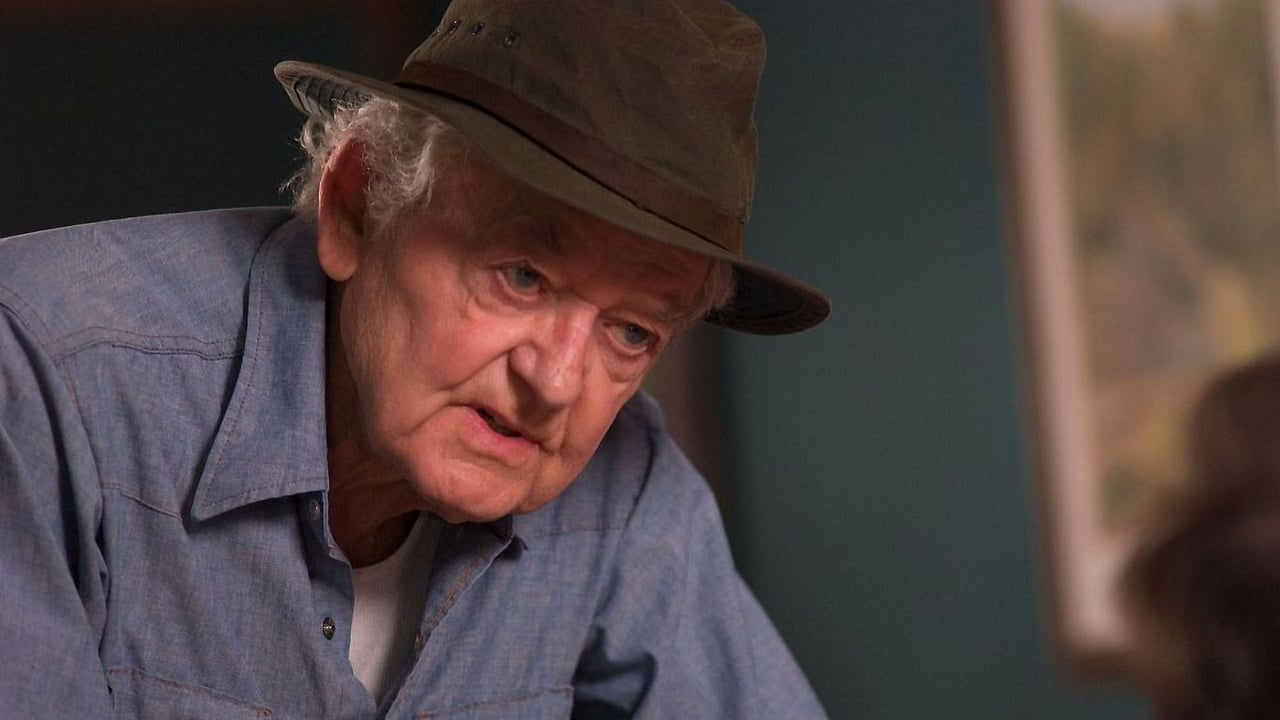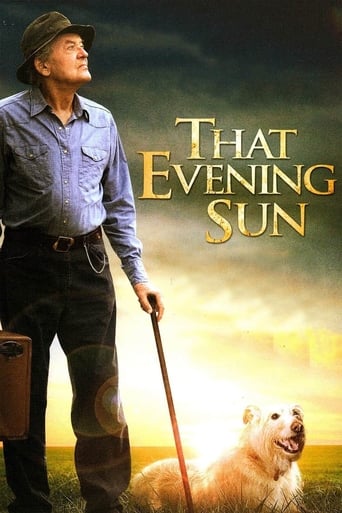



Let's be realistic.
A Brilliant Conflict
This movie was so-so. It had it's moments, but wasn't the greatest.
View MoreBy the time the dramatic fireworks start popping off, each one feels earned.
View MoreHolbrooks acting was good ... but how this movie is rated higher than a 5 is beyond me?!?! This movie started out fine ... an old man does not like being in an old folks home, so he leaves and goes back to his farm. It turns out his son has rented it out, and never told him ... an interesting and believable start.Then it just turns weird ... the old man belittles the current Renter for being white trash. The Renter lets the old man spend the night, but tells him he has to leave in the morning. The old man does not leave, but instead goes and gets a dog, because he knows the Renter hates dog.The Renter does not immediately go to the police, or to his Landlord, to get this guy off the land he is legally renting ... but instead kills the dog? Maybe this is how tenant disputes are done in the South ... calling people White Trash and killing dogs ... but this makes no sense in my world.Oh ... and the old man shoots at the Renter, and gets him arrested. Then the old man decides to frame the Renter for arson, by torching the guest house he was squatting in ... but the Renter is a low life, welfare stealing, wife beating, alcoholic ... so who cares. Right?How is it the old man can trespass (for many days) ... shoot at a man, who is not threatening him ... break into the Renters home ... commit arson ... and in the end not be in jail?!?!Based on the Awards it won, I guess this type of drama plays well in the South. I found myself screaming at the screen how unbelievable this whole story was ... and how is it the police keep showing up, but the old man is left to stay?If you like movies about bitter, mean old men ... and delusional white trash idiots (he was going to be a farmer, but could barely mow the lawn; and had no money to buy the farm) ... that ends with everyone miserable ... then by all means, see this. I wish I turned it off after the first 20 minutes ... it is painful to watch!!!
View MoreBased on the short story "I Hate to See That Evening Sun Go Down" by William Gay, "That Evening Sun" presents us with an epic battle of wills between two equally immutable forces fighting over the same piece of land. The property in question is a rundown farm in rural Tennessee owned by Abner Meecham (Hal Holbrooke), an octogenarian who's just walked away from the retirement home his son (Walter Goggins) placed him in after a serious fall a few months back. When Abner gets back to his farm, he is stunned to find that - thanks to a deal brokered by his lawyer son – the place has been signed over to a white-trash, ne'er-do-well by the name of Lonzo Choat (Ray McKinnon), who now lives there with his wife (Carrie Preston) and sixteen-year-old daughter (Mia Wasikowska), with whom Abner establishes an uneasy but generally tender relationship.Scott Teem's screenplay is multi-faceted and complex in the way it develops its characters. For instance, many of the very same qualities that make Abner so appealing to the audience – his tenacity, his commitment to principle, his uncompromising willingness to call things as he sees them – are also what make him a hard person to deal with for those who are actually a part of his life. This is especially the case with his son, who though he obviously loves his father and wants to do right by him, harbors a lifelong resentment against the old man for his harsh treatment of both himself and his now-deceased mother while he was growing up.To a somewhat lesser extent, Lonzo is also portrayed in a three-dimensional light. Though he is an alcoholic, a wastrel, and a man prone to acts of violence against both animals and members of his own family, there is a sense that he is genuinely trying to get his life together by earning an honest living and finally being a decent provider for his loved ones. The movie really seems to understand the tragedy of old age – of feeling as if everything you ever called your own is now being taken away from you and nobody around you seems to care. In fact, many of those people – despite, in some cases, their possible good intentions - are proactively involved in bringing that outcome about. The movie also touches upon that root and highly American value of property ownership, and the willingness to stop at virtually nothing to ensure one's hold on one's land."That Evening Sun" is what is called in the trade an "actors' picture," and, indeed, it is the performances that are of primary interest here. Holbrooke has always been a tremendous actor, but here he is positively transcendent as Abner, a crusty old coot who is so much more than just a crusty old coot. Goggins, the brilliant star of "The Shield" and "Justified" and a co-producer of this film, is also excellent as Paul Meecham, a role quite different from the ones in the aforementioned works. And McKinnon, Preston ("True Blood"), and Wasikowska ("Alice in Wonderland," "The Kids are All Right") are all wonderful as well.The tone of the film is contemplative and muted, and Teems' direction is rich in atmosphere and setting.
View MoreHal Holbrook (All the President's Men, Into the Wild) stars as octogenarian Abner Meecham, a widowed farmer who has been confined to a nursing home by his lawyer son (played by Walton Goggins). When Meecham becomes fed up with the dull, meaningless life among aging strangers, he returns to his farm, only to find that it has been rented to a man he despises: Lonzo Choat (Raymond McKinnon), a disreputable "white trash" resident of the town who has unrealistic dreams of buying the farm and starting a new life for his wife (Carrie Preston) and daughter (Mia Wasikowska). Choat refuses to vacate the farm, Meecham moves into the sharecroppers' shed, and a battle of wills ensues.Holbrook's performance is mesmerizing – the audience drawn into his battle for the farm he built and tended for half a century, and despite the problems his age presents in managing the land, we want to know that he will succeed in achieving his goal of spending his last years at home. While other characters in the film see Meecham as stubborn, bitter, mean and just a little crazy, Holbrook's portrayal helps us see him as clever, wily and all-too-human as he not only battles for his independence but lives with age-old regrets.Each of the films main characters demonstrate for the viewer what can happen when compromise and communication are eliminated as elements in achieving a solution. Meecham understandably wants to go home, but cannot acknowledge that there is physical risk and financial concern in such a move; Choat wants a new life, but cannot see that such a goal will require more determination and planning than he is able to achieve; and Paul has little sympathy for his father and is locked into a sensible, cost-efficient solution in tending to his aging parent. We watch and hope for cooperation to take place; we think of options that never present themselves, and we wonder if we could do better if faced with similar circumstances.Director Scott Teems' ability to draw the viewer into this southern drama of wills (based on a short story by William Gay) is enhanced through detailed cinematography – close-up shots of elements of decay on the farm make us long for a solution that will reverse the deterioration; interior shots are musty – one can almost smell the dust and wood-rot of aging structures; scenes filmed at night capture the isolation of a farm where threats can be acted upon without witness; and daylight scenes are rich with color and lush greenery, making us crave the beauty serenity of life in the farmlands of Tennessee. Character portrayals are supremely convincing, and while we are prone to side with Meecham, we can also understand the struggles and desires of those others who hope to start over or do what is best under difficult circumstances.The winner of more than 40 awards and massive critical acclaim, That Evening Sun is a treasure among independent films that will linger in the hearts and minds of viewing audiences long after the films' end.
View MoreI've been looking forward to "That Evening Sun" for a while now, and not just because it was shot in the county and surrounding towns where I live here in Tennessee. My anticipation was largely because of Hal Holbrook, an iconic performer I have seen in his one-man "Mark Twain Tonight!" stage show, and who appears in occasional guest shots on TV where things must move very fast, and less often in film, where things are allowed to proceed at a more measured pace.I was not disappointed, the character study of Abner Meechum, the refugee from an old folks' home and renegade on his own property is rich, complex, and satisfying throughout. Admittedly it may not be a big stretch for Holbrook to play a cranky 80-year-old, but that doesn't lessen the impact of the performance at all.Surrounding him is a cast of surprisingly strong players: the antagonist Lonzo Choat (Ray McKinnon) is an especially worthy and believable opponent, and supporting cast Pamela and Ludie Choat (Mia Wasikowska and Carrie Preston) likewise hit just the right notes, tugging this farm county family drama at precisely the right pace. I especially enjoyed Barry Corkin, perfect in the Wilfred Brimley-esquire good neighbor role, and a special mention for the cameo by Dixie Carter, Hal Holbrook's wife in the movie as well as in real life.Where I saw the film, at a packed 1pm matinée, the audience laughed at several of the moments, self-reflective as they were of Tennessee rural life. I don't know that they would garner that kind of introspective appreciation in other parts of the country, but here, people know their country folk and can laugh with, rather than at them."That Evening Sun" is a simple yarn: Abner tires of life in a retirement home and returns to the farm he and his deceased wife occupied for most of their lives, only to find it occupied by a neer-do-well, but one with a property lease Abner's "guardian son" has approved. The story is more than the tug-of-war between owner and lessor, it is between hard-working- older and layabout younger, and between lives at noon and the sundown that inevitably follows. Taken from William Gay's short stories of Southern life, "I Hate To See That Evening Sun Go Down," it's the unraveling of a proud man in the twilight, as his own sun is setting, and his fight with the oncoming night.Hal Holbrook is a treasure. So is this film. It's Indie with a capital "I", an armful of festival awards, and, one hopes, a long run ahead.
View More